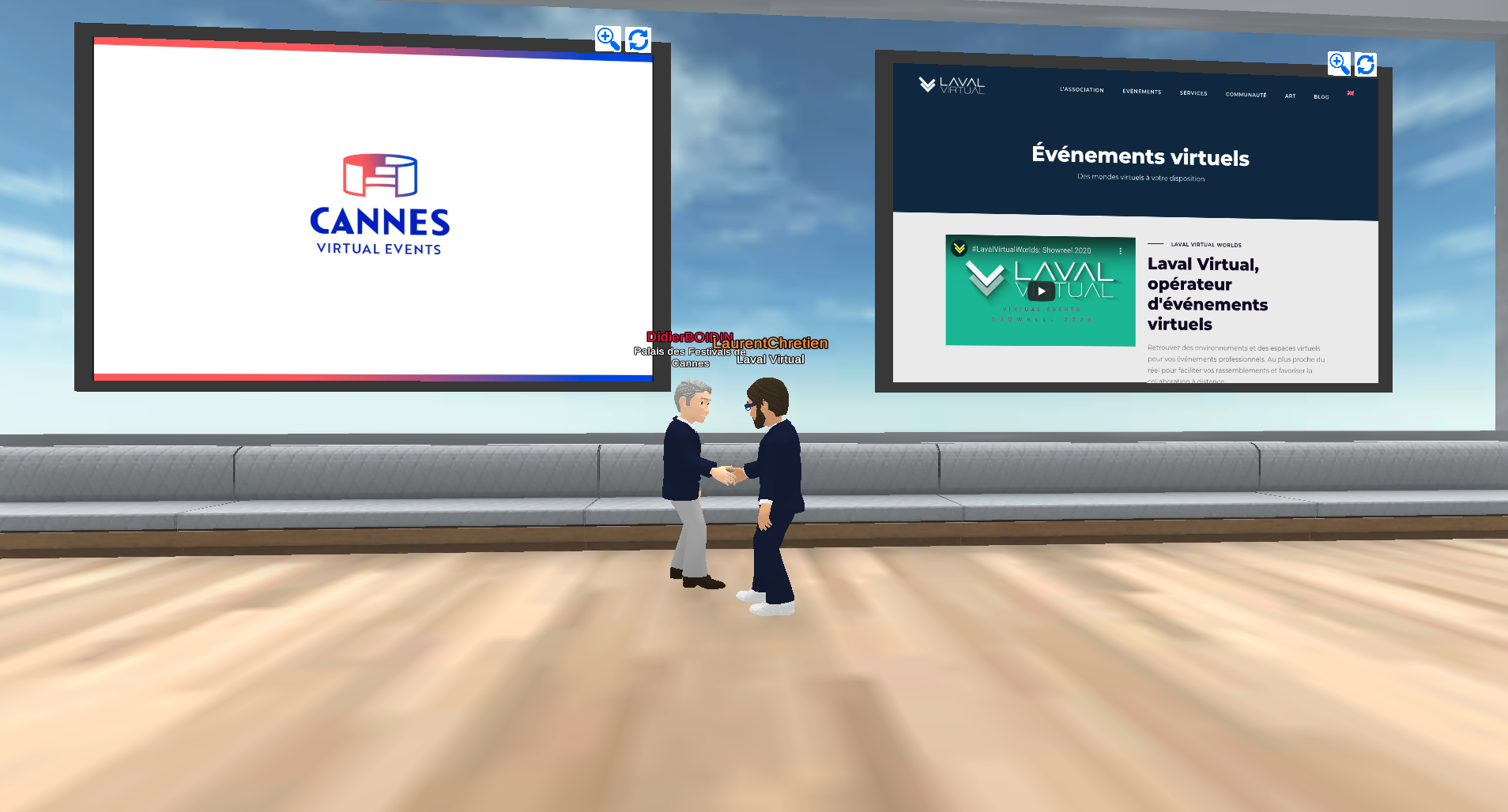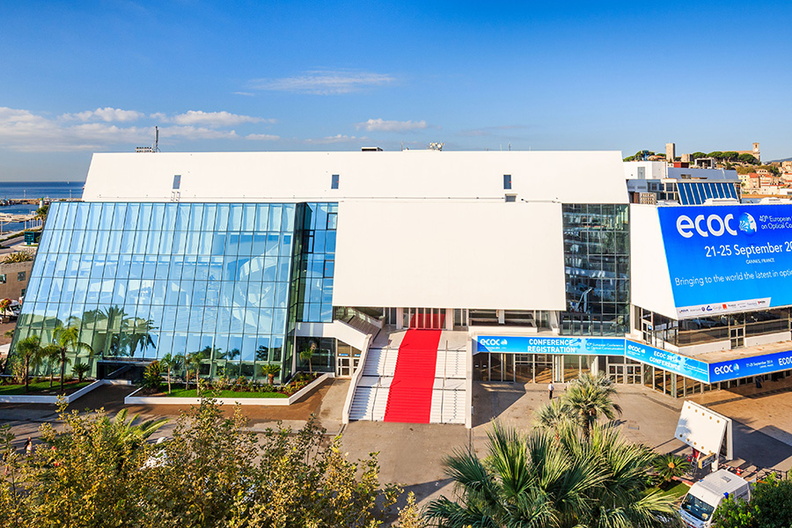
Didier Boidin and Laurent Chrétien made the collaboration official in the Laval Virtual World.
Crédits photos : Virbela / Laval Virtual
The Palais des Festivals et des Congrès of the city of Cannes has announced the creation of Cannes Virtual Events. In collaboration with Laval Virtual, the structure is going to propose to its recurrent and new clients a solution to organize virtual and hybrid events. Meeting with Didier Boidin, general manager of the Palais des Festivals, who gave himself to the exercise of the crossed interview with Laurent Chrétien, CEO of Laval Virtual.
Can you briefly remind us of the activity of the Palais des Festivals of Cannes ? What kind of events are organised there ?
Didier Boidin: The Palais des Festivals et des Congrès of Cannes is the second congress centre in France in terms of size, except for Paris. Every year we welcome mythical shows, like the Film Festival, but also a certain number of recurrent professional and international shows. We are a major convention centre, both in terms of size and events.
One of our major assets is that we are lucky enough to be on the Croisette. Unlike our colleagues, we have the advantage of being right in the city centre and being able to do everything on foot from the Palais des Festivals. The idyllic setting is our number one asset: professionals who come to Cannes for a seminar have breakfast on the terrace, go for lunch on the beach and can easily go out in the evening. This is the strength of the destination: a unique environment, right in the centre of town, with some very nice annual events.
In March 2020, when the national lockdown was announced, how did it go at the Palais des Festivals? A few weeks before, the government had started to reduce the size of events. Were you prepared for such a situation?
Didier Boidin: In February 2020, I had the chance to participate in a professional seminar in Rome with trade fair and congress managers from all over the world. It was the first time I heard people talking seriously about this crisis. There was a Chinese speaker who couldn’t go home because the borders were closed. So we spent two days talking about this.
When I got back to Cannes, I called the management team, and I warned everyone that this crisis was coming and that we couldn’t miss it. But honestly, nobody took it seriously. In France, people thought that it was not going to come out of China. So I trusted my instincts and started working on a plan to save the business. So when the lockdown came, we were relatively well prepared, but confident that everything would start up again in three months.
How long have you been thinking about getting into hybrid and virtual events?
Didier Boidin: Two trends have emerged from this crisis: firstly, CSR, i.e. everything to do with environmental protection and corporate social responsibility. And hybridisation. To be honest, I was one of the first to say that this was not adapted to our activity. Our role is to welcome people to a destination, to fill the hotels; not to do virtual events.
As time went on, we started to change our minds and say that hybridisation was inevitable and that we had to prepare for it. I attended a presentation on the services of Laval Virtual as part of France Congrès. Then I had the opportunity to be in contact with Laurent [Chrétien, editor’s note] on several occasions. This led to some interesting exchanges. Our vocation is not to become a virtual palace, but we are convinced that there are opportunities to be seized in this field.
How did this partnership between Laval Virtual and the Palais des Festivals go? Who approached whom?
Didier Boidin: Sincerely, it is above all a beautiful encounter. Both sides did not envisage this partnership before, but there was a meeting that triggered everything. We quickly realised that we had common values and objectives.
Laurent Chrétien: The best projects are built with encouters. Beyond pure business, building projects happens with sparks flying between several people. So it was a fairly natural and logical encounter. The general context of the health crisis also accelerated things. Sometimes, there are some obvious things that are quickly realised.
Apart from this wonderful encounter that you tell us about, what guided you in choosing Laval Virtual?
Didier Boidin: The Palais des Festivals collaborates with important partners and clients who organize recurrent events. To present this new project, it was imperative that we present them with a credibility. Other structures presented us with offers of 2D platforms and digital systems, but none of them had already organised a show. What seduced us, apart from the personalities we met at Laval Virtual, was this credibility, and the fact of having a serious partner who is also one of the most important on the current virtual market.
Are any of your clients interested in virtual events at the moment?
Didier Boidin: Yes, we have several clients interested in hybridisation. We have already presented the Virbela platform and the project to some of our clients. Some have had very positive reactions, and others have legitimately had questions about the technical problems that may arise. But what is positive is that every time we present the concept, our partners find it interesting and want to see what it looks like. That’s where we have to work to seduce and convince.

The Palais des Festivals de Cannes is one of the most important congress centres in France. (Photo credit: Palais des Festivals de Cannes)
Is this choice of virtual and hybrid technology an immediate response to the health crisis and/or a long-term investment?
Didier Boidin: We have all been hit hard by this crisis and we are living it day by day. It has had the advantage of making us think more strategically. We want to keep our leading position: if progress is to be made, the Palais de Cannes will be the pioneer because it is one of the most important congress centres in France. But today, we don’t know when and how we’ll get out of this crisis. This virus has paralysed the whole world, and we know that it can start again tomorrow. Finally, launching into the virtual world is therefore a way of being a little more prepared to tackle a new crisis, but also to extend our range of services. It was primarily a reaction to the crisis, but it can become a real asset for the palace.
Do you believe in the future of virtual events?
Didier Boidin: The hybrid and the virtual will continue. The virtual has become important in our daily lives. Personally, when I can avoid a trip to Paris for a two-hour meeting, I do it. However, the virtual will not replace face-to-face interaction. People need to meet and spend time together. In Cannes, we deal with a lot of business, and that can be more difficult in a virtual world, at least at first sight. For me the virtual will last, with adaptations, but it will last. It will become more precise, pleasant, welcoming.
Laurent Chrétien: I share this point of view. A year ago, we would never have imagined that we could start our collaboration without meeting in person. It’s incredible! Today, it is clear that business travel is reduced. When I am asked to attend conferences or presentations, I really wonder about going physically. The physical part will have to increase in value to be relevant and sustainable. However, an event like Laval Virtual is above all a community gathering. People like to come there, see each other, discuss together. There is a very strong social dimension. On the other hand, the virtual can be interesting for a real estate or job fair for example.
Will this continue even after the health crisis, when everyone wants to see each other in the physical world?
Didier Boidin: I think so! For us, with a hybrid event, the clear advantage is the possibility of reaching more people. On a physical show with which we hope to attract 5,000 people in Cannes, we can hope to reach 20 to 30,000 people with the virtual world. I have always said that the real luxury is to have the choice. People want to be able to choose and don’t like to have a solution imposed on them. With the hybrid, they will have the choice to participate in what they want, when they want, where they want. And they will have the choice to come face-to-face to meet the community. But the fact that they can choose is fabulous!
Laurent Chrétien: It’s true that, for many reasons, we can choose to travel or stay at home to follow an event. Sometimes you go to conferences to meet a certain person, thinking that talking to them in person will have more impact. But this is less and less true! For reasons of CO2 and travel savings, the virtual is sustainable.
Didier Boidin: When I was hired at the Palais in 2019, the mayor of Cannes told me that we had to prepare for the event of tomorrow. At the time, there were some environmental issues, but we were just talking about managing waste bins. With the crisis, everything has accelerated and I have a much clearer roadmap. With this crisis, I have a much better idea of what the 2030 exhibition will be like. It’s going to go much faster than we think and open a lot of doors.
Laurent Chrétien : This may even call into question the economic models of the events in a rather strong way.
Speaking of economics, what about the ROI of a virtual exhibition? Is it the same as for a physical exhibition?
Didier Boidin: For the moment we have to be honest, we cannot compare the turnover of a face-to-face trade show with the turnover of a virtual show. In fact, there are fewer profits, and therefore less money to be made.
Laurent Chrétien: However, objectively, it depends on the organiser’s objective. If his objective is to bring qualified leads to exhibitors to do business, and this objective is achieved, a virtual exhibition is no more different than a real one in terms of price.
Didier Boidin: It’s true! I think that it is the clients who will push the organisers to change their economic model and to shake up the traditional methods. There is indeed an economic dimension that is important and that will evolve rapidly.
Laurent Chrétien: In the end, the right summary is to say that we can see trends, but that they are still wrapped up in a layer of uncertainty. As a virtual solution provider, mental and technical preparation must be part of our daily routine from now on. It is this exercise in agility, anticipation and risk control that we can bring to the clients of the Palais des Festivals. But it also means offering them a piece of innovation: inventing another future for the event.


